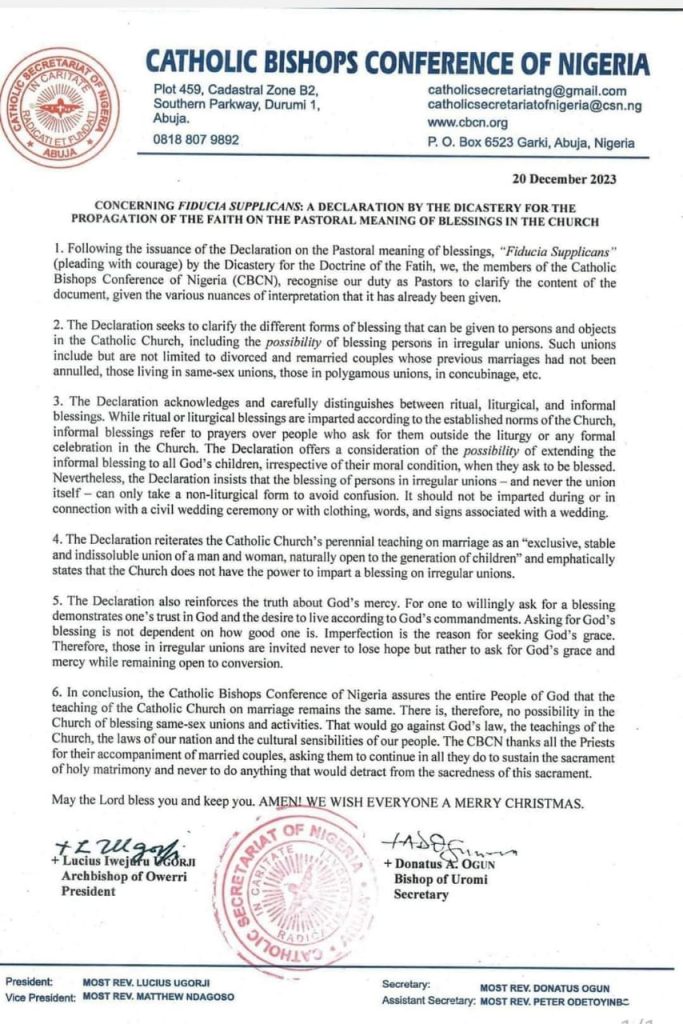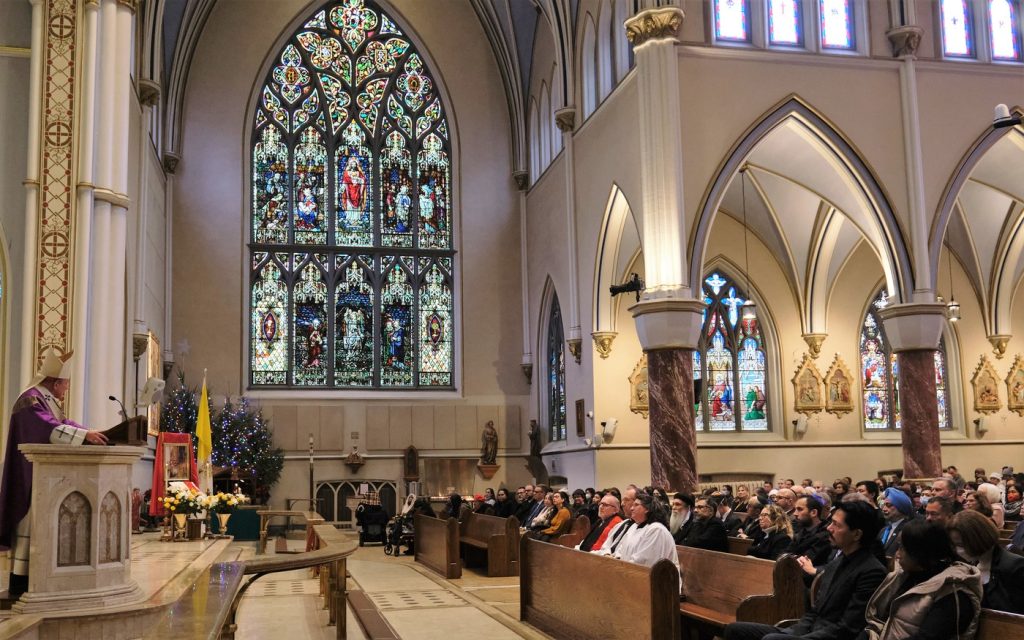
Before we kickstart the Nigerian Church’s position and their congregation’s divergent views, we need to recap what the Vatican strictly directed the clergy to observe. It is essential to know before the Vatican allowed the blessings of same-sex couples, in Europe, there was a rebellion to support benefits for same-sex couples. Those countries, including Germany and Belgium, had permitted blessings for same-sex couples without the approval of the Holy See.
It can conceivably be argued that the Holy See was only pandering to the European Churches that had defied the Vatican norms, doctrinal precepts and the Church hierarchy when they broadened the meaning and interpretation of the “blessings”. This is also supported by promotions and demotions of the clergy based on their positions on the matter. Those who are critical of the Vatican’s directive are removed from positions of power, and those who support have seen their pastoral career advancing.
Some have even begun to question the latest appointments and demotions worldwide of cardinals and Bishops as to whether portending to the reshaping of the election of the next Holy See would favour whoever sanctions the blessing of the same-sex couples lest he overturned it. So, packing the Cardinal Council with like-minded on this matter may aid the election of the Holy See, who is in all four corners with blessings for same-sex couples. So, he will sustain it for the foreseeable future! Again, this is a mere speculation, at least for now.
The Vatican directed her clergy to cease judging lest they begin “excluding, denying and rejecting” those who knock on the door of the Church to find what was lost in their lives. And this is supported by the scripture to a certain extent.
The scripture narrates how a shepherd left 99 sheep to seek and find the lost one, and when he found it, he was delighted. In another parable, it was said a woman had ten pieces of silver but lost one bit. She left the rest and searched for the lost one, and when she found it, she called her friends to celebrate with her. The scripture revealed that there was joy in heaven when one sinner repents than ninety-nine righteous who needed no repentance.
Also read Roman Catholic Church’s Stance on Blessing Same-Sex Couples: Can We Bless Sinners?
In 2021, the Vatican decreed that the Catholic Church would not bless same-sex marriages because God “cannot bless sin.” But it seems that some of the Catholics confuse blessings and the sacrament of marriage, which the Church lacks the authority to annul or modify. The confusion arises because many Catholics cannot differentiate sin and people who conduct themselves as sinful sinners.
In the Old Testament, the violations of an individual of the commandments of God were punished. Still, when Christ Jesus refused to judge a harlot caught in the very act of adultery, he clarified the position of the Church. Christ Jesus ordered her accusers, who were sinless, to be the first to cast a stone against her so that she may die of stoning.
After issuing that directive, Christ Jesus sat down. He began to write things on the ground, which were later interpreted to mean that He had convicted the conscience of her accusers of the sins they had committed. After coming to terms with their sinful nature, her accusers departed one after another, leaving a pile of stones behind them. After all of the accusers had left, the scripture says Christ Jesus raised His head and asked her where her accusers were. She replied to Him they had left. He said to her neither would He judge her, but she should go in peace and sin no more.
So, this is a doctrinal argument behind the same-sex couple blessings, which, in a nutshell, can be summarized as follows: since we are all sinners in the eyes of God, let us restrain ourselves from judging others. This position is also scriptural as in the Gospel of Luke 6: 38, it was commanded that the believers should judge not, lest the same yardstick they judge others be meted out to us.
The Nigerian Church supports the position of the Vatican, albeit it has promised to continue educating its congregation. There is a misstep in regarding Nigerian Catholics as if they are all the Bishops of Nigeria. The faithful are members of the Church but not its authorized speakers. It is the Bishops who articulate the position of the Vatican.
Admittedly, many Nigerian Catholics do not support same-sex blessings and have made their views known, citing the same Bible to justify their grandstanding. The faithful main point of contention is what Jesus Christ instructed about the sanctity of marriage between a man and a woman. They quote Him when he reminds the believers that from the beginning, God created a man and a woman, and He put them in the Eden Garden. They also add Jesus Christ had said what God has joined, let no man be put asunder.
Essentially, the two sides of the controversy do not see eye to eye in only one area: the correct interpretation of blessings. The Church says blessings are not a condonation of human sinful deeds but a prayer for conversion to God’s law.
Another area of dispute is whether the Church was succumbing to the European pressure to accept same-sex blessings as a first step to the issuance of sacraments for same-sex marriage. What is to stop them from receiving the sacrament of marriage if they are now blessed?
If that is not the whole story, the Church shot herself in the knee centuries ago when she parlayed Mary the Blessed almost equal to the Lord Christ Jesus. So, the exaltation of Mary the Blessed adds another fire to the turmoil of interpretations.
According to the Church, the believers should pray through Mary, the Blessed, because her cousin, Elizabeth, the mother of John the Baptist and herself being moved by the Holy Spirit had prophesied the whole world would call Mary, the blessed among the women. Perhaps the most evidence from the scripture that she is blessed is a prophecy of the Archangel Gabriel when He prophesied to her that God highly favours her, that she was blessed among women, and God was with her.
So, the faithful have a giant axe to grind because centuries after centuries, the Church had used the blessings of Mary to justify elevating her to stratospheric heights only below Christ Jesus, the Amen. So, now the Church is downgrading the value of the approval to include those who glorify disobedience as vexatious ammunition to salvation: That the Church is blessing them as humans without justifying their wicked deeds.
That is a tough act to follow for the faithful in a few days and months to come. The two diametrically opposite positions cannot be held together for long, and one must yield to the other. It is akin to serving wealth and God. It is impossible. Either mammon will prevail, or God will subdue wealth.
It isn’t easy to reconcile the two diametrically opposite positions in a few days. The Nigerian Church knows this, which explains why she urges patience and understanding.
Over the long haul, it is unclear how the two sides of the aisles will reconcile their understanding of the scripture. However, being in the ministry of reconciliation should breathe the spirit of consolation to all of them that one day they will settle their differences one way or another.

